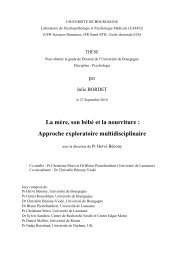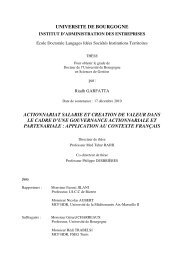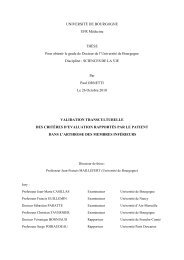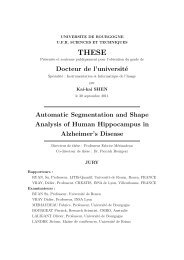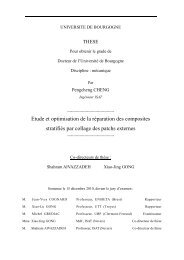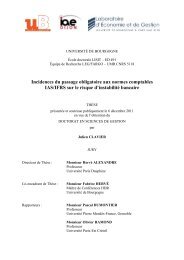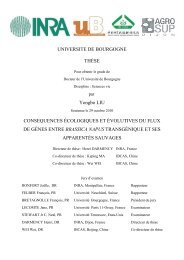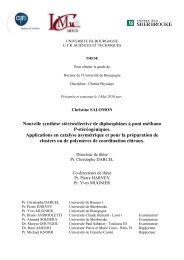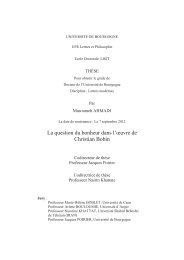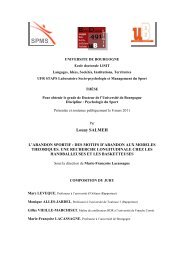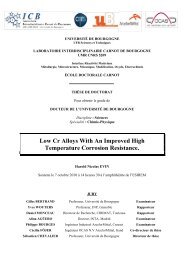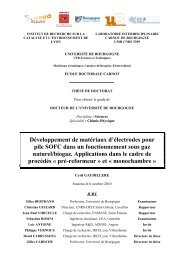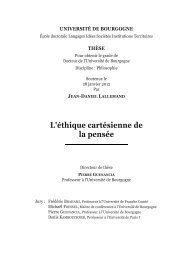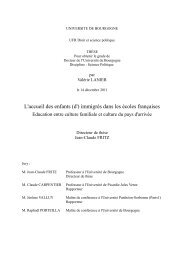Higher education in Asian countries and the role of international ...
Higher education in Asian countries and the role of international ...
Higher education in Asian countries and the role of international ...
You also want an ePaper? Increase the reach of your titles
YUMPU automatically turns print PDFs into web optimized ePapers that Google loves.
167<br />
The CELE is actively work<strong>in</strong>g to set new st<strong>and</strong>ards <strong>in</strong> construction <strong>of</strong> physical facilities for<br />
<strong>education</strong> <strong>and</strong> research. Its major areas <strong>of</strong> functions are (OECD, 2011) (OECD, 2011) (OECD,<br />
2011):<br />
Innovation <strong>in</strong> <strong>the</strong> design<br />
Evaluat<strong>in</strong>g <strong>education</strong>al facility policies <strong>and</strong> practices<br />
Management <strong>and</strong> susta<strong>in</strong>ability <strong>of</strong> learn<strong>in</strong>g environment<br />
The CELE helps members to maximize <strong>the</strong>ir benefits from <strong>the</strong> <strong>in</strong>puts <strong>in</strong> <strong>education</strong>al <strong>in</strong>stitutions,<br />
facilities <strong>and</strong> equipments through better plann<strong>in</strong>g, effective design, environment friendly<br />
construction, smart management <strong>and</strong> cont<strong>in</strong>uous evaluation. Today CELE is comprised <strong>of</strong> twelve<br />
governments <strong>and</strong> sixteen associate participants from n<strong>in</strong>e <strong>countries</strong>.<br />
5.2.5.1.4 Centre for Educational Research <strong>and</strong> Innovation (CERI)<br />
This centre was established <strong>in</strong> 1968 <strong>in</strong> order to response <strong>and</strong> to meet <strong>the</strong> rapid global changes<br />
<strong>and</strong> <strong>in</strong>novation <strong>in</strong> <strong>education</strong> systems. To stimulate <strong>in</strong>novative th<strong>in</strong>k<strong>in</strong>g <strong>and</strong> culture <strong>of</strong> research <strong>in</strong><br />
<strong>the</strong> member economies <strong>the</strong> CERI is engaged <strong>in</strong> <strong>education</strong>al research, conceptual <strong>in</strong>novation <strong>and</strong><br />
exploration <strong>of</strong> new fields <strong>in</strong> diverse fields that ranges from all level <strong>and</strong> all ages lean<strong>in</strong>g process<br />
to policy mak<strong>in</strong>g. CERI is br<strong>in</strong><strong>in</strong>g extensive expertise, <strong>in</strong>tensive labor <strong>and</strong> effective<br />
methodologies at one po<strong>in</strong>t to promote <strong>in</strong>novative th<strong>in</strong>k<strong>in</strong>g, responsive learn<strong>in</strong>g accord<strong>in</strong>g to <strong>the</strong><br />
societal needs, futuristic <strong>education</strong>al <strong>in</strong>stitutions, <strong>and</strong> forward-look<strong>in</strong>g research analyses <strong>and</strong><br />
syn<strong>the</strong>ses.<br />
5.2.5.1.4.1 CERI, higher <strong>education</strong> <strong>and</strong> E-learn<strong>in</strong>g<br />
With <strong>the</strong> advancement <strong>of</strong> ICTs, e-learn<strong>in</strong>g is becom<strong>in</strong>g <strong>in</strong>creas<strong>in</strong>gly important <strong>in</strong> <strong>education</strong> at all<br />
levels particularly at higher level. But still all students are not fully exploit<strong>in</strong>g <strong>and</strong> benefitt<strong>in</strong>g<br />
from <strong>the</strong>se technologies. Likewise HEIs, particularly <strong>in</strong> <strong>the</strong> less developed <strong>countries</strong>, are not<br />
properly prepar<strong>in</strong>g <strong>the</strong>m for future technologies. Though many universities are gradually<br />
br<strong>in</strong>g<strong>in</strong>g e-learn<strong>in</strong>g <strong>in</strong>to <strong>the</strong> ma<strong>in</strong>stream <strong>of</strong> <strong>the</strong>ir <strong>education</strong>al programs, a questions arise; will this<br />
trend cont<strong>in</strong>ue? How can governments <strong>and</strong> <strong>in</strong>stitutions make fur<strong>the</strong>r progress <strong>in</strong> e-learn<strong>in</strong>g? To<br />
answer <strong>the</strong>se questions, <strong>the</strong> OECD Centre for Educational Research <strong>and</strong> Innovation (CERI) - E-<br />
learn<strong>in</strong>g <strong>in</strong> Post-Secondary Education <strong>and</strong> tra<strong>in</strong><strong>in</strong>g, <strong>in</strong> partnership with <strong>the</strong> UK-<br />
based Observatory on Borderless <strong>Higher</strong> Education (OBHE), carried out a survey <strong>of</strong> e-learn<strong>in</strong>g<br />
<strong>in</strong> 19 tertiary <strong>education</strong> <strong>in</strong>stitutions <strong>in</strong> 13 <strong>countries</strong>. The qualitative f<strong>in</strong>d<strong>in</strong>gs <strong>of</strong> <strong>the</strong> project were<br />
complemented by an OBHE survey <strong>of</strong> onl<strong>in</strong>e learn<strong>in</strong>g <strong>in</strong> Commonwealth universities undertaken



